|
Printables |
PowerPoints |
Online exercises |
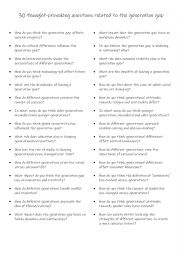
|
30 thought-provoking questions related to the generation gap
This worksheet is suitable for CEFR B1+ -C1 LEVEL students. The 30 questions provide a wide range of questions relating to Generation Z and previous generations with views on social media, technology, environment and the workplace.
Level: advanced
Age: 14-100
Type:
Downloads: 104
|
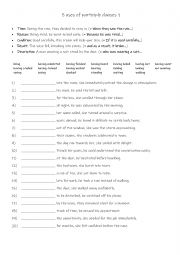
|
5 uses of participle clauses 1
Students should learn the five uses of participle clauses because they help create more concise, fluid, and sophisticated sentences. These clauses allow for the expression of time, reason, condition, result, and description in a shorter, more efficient way, making writing and speaking more dynamic and less repetitive. For example, participle clause...
Level: intermediate
Age: 10-100
Type:
Downloads: 108
|
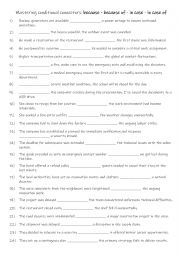
|
B1-B2 Mastering conditional connectors: because - because of - in case - in case of
Learning how to use because, because of, in case, and in case of offers significant benefits for both spoken and written English, as they help students clarify cause, reason, and conditions in different contexts.Mastering these phrases allows students to explain reasons and conditions more clearly, enhance their formal and informal communication, a...
Level: intermediate
Age: 10-100
Type:
Downloads: 109
|
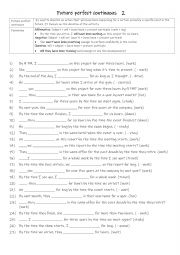
|
B1+-B2 Future perfect continuous 2
First, students need to familiarise themselves with the tense and check formation and use. Then they read the sentences to work out which form is needed to complete the gap-fill using the infinitive in (). Answers on page 2
Level: intermediate
Age: 10-100
Type:
Downloads: 105
|
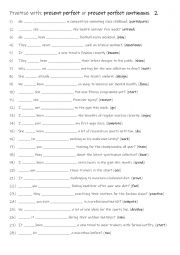
|
A2+-B1 Practise with present perfect or present perfect continuous 2
Mastering the 2 tenses enables students to discuss life experiences, actions that continue from the past, and to link past events with the present, improving fluency and communication in various contexts. First Students familiarise themselves with the 2 tenses and their use. Then they read the sentences to work out which one is needed to complete t...
Level: elementary
Age: 10-100
Type:
Downloads: 120
|
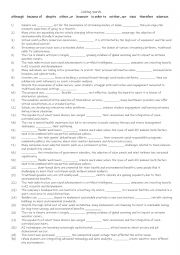
|
B2-C1 10 Linking words used in current trends - topics
These linkers help in clearly and precisely expressing relationships between ideas, making communication more effective. Learning them allows you to vary sentence structures, avoiding repetition and making your language more engaging and sophisticated. They are essential in constructing logical, coherent arguments in both written and spoken languag...
Level: advanced
Age: 12-100
Type:
Downloads: 117
|
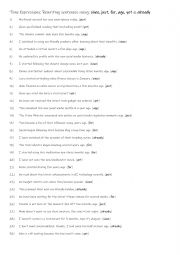
|
B1 Time Expressions Rewriting sentences using since, just, for, ago, yet & already
Rephrasing helps students understand the content better by forcing them to process and express ideas in their own words. Learning to rephrase properly helps students avoid plagiarism by expressing ideas in their own words rather than copying text directly. Mastering the skill of rephrasing can boost students� confidence in their language abilitie...
Level: intermediate
Age: 10-100
Type:
Downloads: 102
|
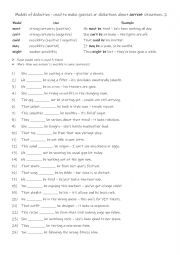
|
A1+-A2 Modals of deduction - used to make guesses or deductions about current situations. 2
Students should learn modals of deduction because they are useful for expressing logical guesses or assumptions about present situations, helping speakers show how certain or uncertain they are. These modals, such as must, might, could, and can�t, make speech sound more natural and fluent, improve communication and reasoning skills, and are commo...
Level: elementary
Age: 8-100
Type:
Downloads: 112
|
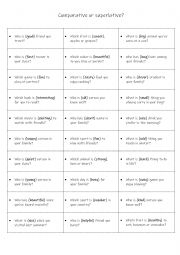
|
Comparative or superlative sentence practise 2 B
This worksheet is suitable for CEFR A2 level students. A 30 generic question worksheet using the same adjectives in worksheet 2 A.Students reinforce the comparative or superlative grammar part with a speaking component.
Level: elementary
Age: 9-100
Type:
Downloads: 103
|
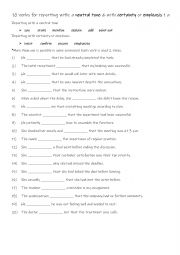
|
10 verbs for reporting with a neutral tone & with certainty or emphasis 1 a
First, students need to familiarise themselves with the 10 verbs and check their meaning and use. Then they read the sentences to see which verb is needed to complete the sentence. Each verb is used 2 times! Answers on page 2
Level: intermediate
Age: 10-100
Type:
Downloads: 112
|
|
|
|
|












